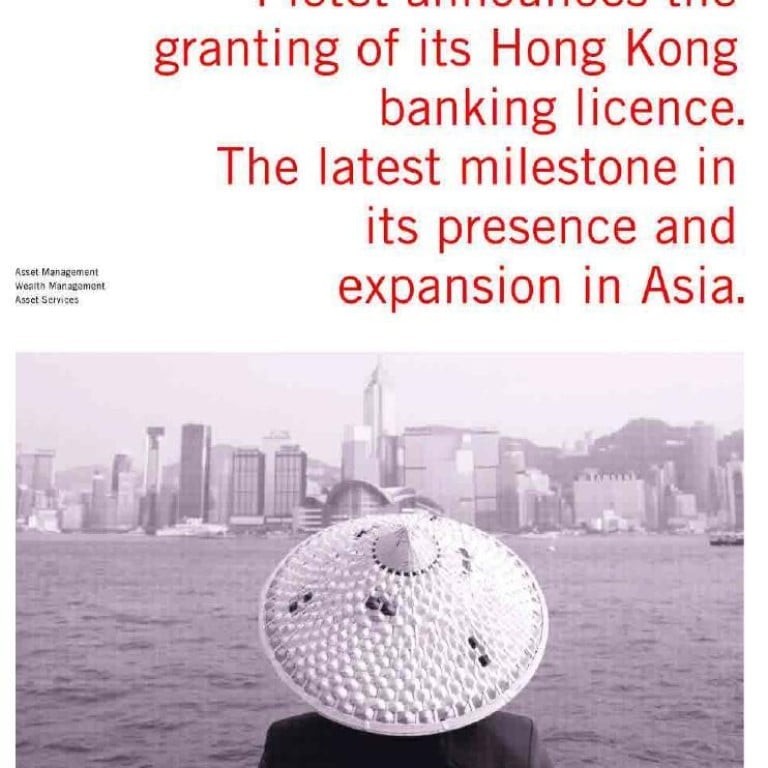
Pictet advertisement baffles readers

The good folks at the bank directed me to their PR agency, Weber Shandwick, who boast the tag “Marketing Magazine 2011 Hong Kong's PR Agency of the Year HKMA/TVB Awards for Marketing Excellence 2011 Best Marketing Partner” (sic). With all that behind them, they must know their stuff.
A nice chap called Giles Harrison, account supervisor, seemed surprised to be asked to explain the thinking behind this obviously very expensive ad. He would have to ring head office in Geneva and get back to me. Next day he did, telling me he had received further comment from the Geneva team overnight. “As the launch advert for Pictet’s Hong Kong branch, the image represents a bridge between old and new and a look into the future.”
Someone in a coolie hat staring at Wan Chai? I suggested he was pulling my leg and was not serious. Wrong. Back he came again. “It’s an artistic image and the bank liked it as they felt it captured the spirit mentioned below, and as a piece of creative (sic) others may see what they want in it. We appreciate your feeling differently about the image selection, but there is no more complex decision process beyond that.”
Still no nearer to a real explanation, so back to Pictet again. The head honcho, CEO Asia Claud Haberer, was out of town, a helpful person told me. I asked about the ad and said please don’t refer me to your PR people because they just ask Geneva and twice the response has shed no light whatsoever. The nameless member of staff giggled. “Oh, whatever you ask them, even if it’s ‘Will you be home for dinner tonight?’ the answer is ‘I’ll have to ask Geneva,’” I was told. This was a pointless mission anyway, because the advertising and marketing department was in London, not Geneva. Mine was not the first phone call received about the baffling advert, I was told.. “Actually,” the Pictet employee added, “I don’t understand it either and would like to know what it’s about as well.”
China’s Empty Piggy Banks
It sounds like all that stuff about mainland Chinese stashing their savings in cash under the mattress because they don’t trust banks is just an urban, or in this case, probably a more rural, myth. A survey by China’s Southwestern University of Finance and Economics in 2011 found that 55 per cent of families saved nothing at all last year. There goes the idea that farmers and migrant workers hoard their cash to pay for their parents, children’s education and healthcare.
The survey also found that wealth was concentrated at the top end, in the upper 10 per cent, accounting for 87 per cent of the country’s wealth and 56 per cent of household income. It’s a far cry form the 32 per cent figure bandied about by China’s National Bureau of Statistics.
The rich are steadily getting richer in China, which should be a cause for concern, if acknowledged. In 1095 the figure was a modest 31 per cent, rising to 41 per cent in 2002, and now it’s reached 87 per cent. By contrast US figures show the super rich control only 75 per cent of America’s wealth. Very few people emigrate to China, it’s not top of any economic migrant’s most wanted list, so it’s safe to assume that should the mainland follow the US and ramp up tax rates for rich people, it might prompt a flight of capital and wealthy folks offshore, since it’s safe to assume that like all the super rich, they have acquired foreign passports and bought assets and homes abroad. That would leave the poorer 90 per cent of China’s population behind, wondering where all the money went.

